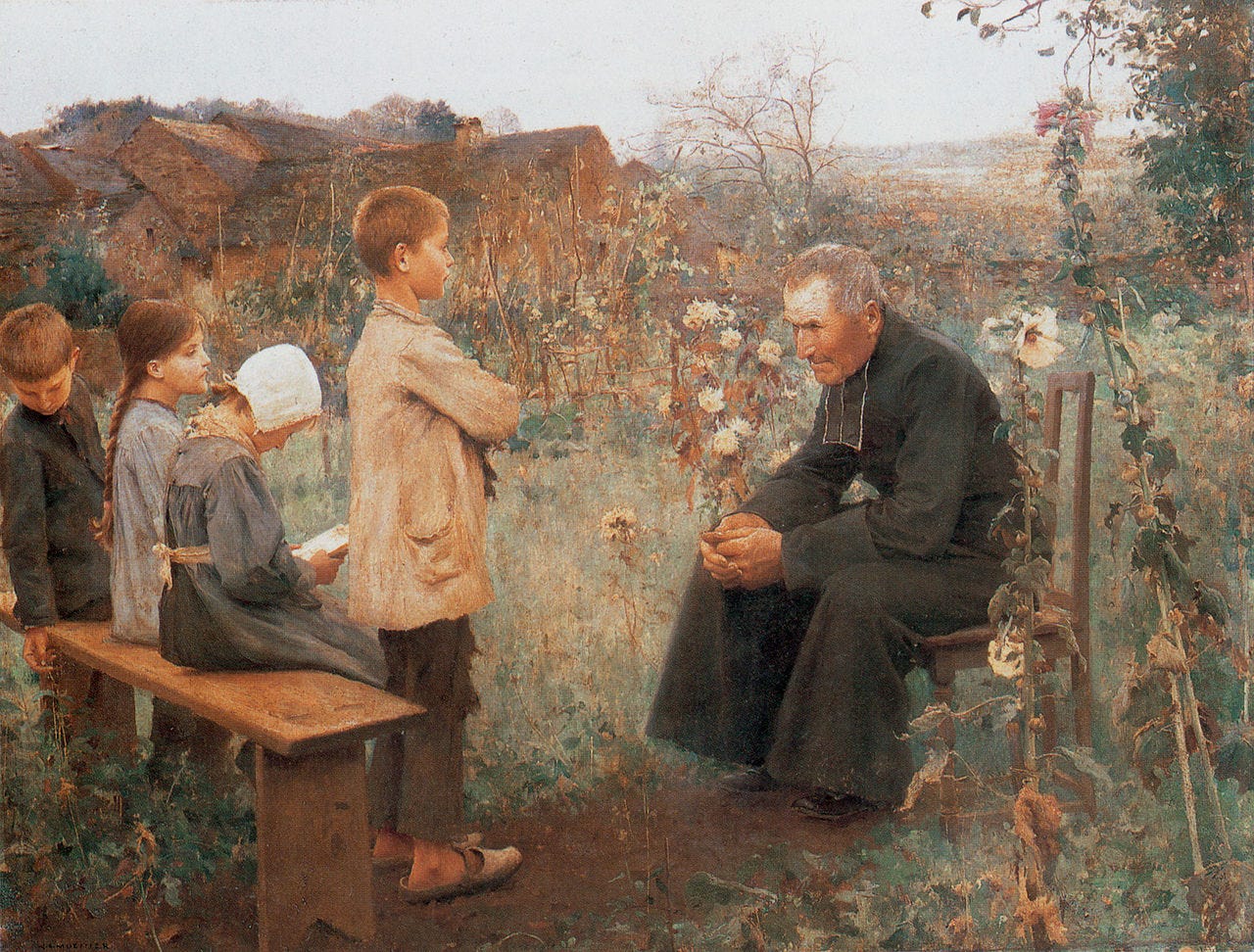Catechism is traditionally understood as an historic method for teaching Christian doctrine. Catechism involves a series of questions and answers which are memorized and used to instruct on the essentials of Christian belief. Throughout history many Christian traditions have catechized their children. The questions and answers in a catechism highlight certain doctrinal distinctives in a tradition, however, overall Christian catechisms keep the essentials of Biblical faith. Martin Luther, John Calvin, and other Protestant reformers wrote their own catechisms to instruct children and new converts at their churches. The great classical composer Johann Sebastian Bach even set portions of Luther’s catechism to congregational music. Children all throughout Europe would grow up memorizing Psalms, Proverbs, and their catechism as a part of their educational scope. This was also true in the United States for about the first half of our nation’s history.
We may be tempted to disregard catechizing children as unnecessary. It sounds archaic and perhaps a bit too much like indoctrination for our comfort. But this inclination forgets that catechism is inescapable. It is not whether we catechize our children but rather which way will we catechize them. Marketing strategists, propagandists, politicians, writers, artists, and influencers all work using a type of catechism. When you watch a sitcom, a laugh track catechizes you. You are being instructed to laugh at certain situations, gasp at others, and to feel sentimental when the crowd says “awwwwww.” Netflix, gifs, memes, short social media clips, and ads, more often than not, instruct you on how to react and what to react to. All of this deeply influences what we find funny, shocking, good, satisfying, attractive, true, or sentimental. All of it is a type of catechism which shapes our tastes and gut reactions.
I remember walking past a street preacher in college and feeling a sense of embarrassment on behalf of the preacher. To this day, I cannot tell you the content of what that preacher was saying. For all I know, it could have been a perfectly Biblical gospel presentation given in love. I felt embarrassed not because of the content of the message, but because I had been trained to view the very act of street preaching as something to disdain. The repeated question of “you’re not like those Christians, right?” had shaped my affections. If we cringe at someone speaking the truth or someone doing something virtuous, this should be a red flag to us. We may be catechized by the world in more ways than we know. Catechizing can either be a good influence or a bad influence, but it depends on the purpose and direction.
In our homes, we catechize when we prompt our children to say “please” and “thank you”, or when we praise them for certain actions, or when we discipline them in response to their bad behavior. Of course our children will not always feel grateful when they say “thank you.” But, this type of catechizing helps to train them to know when they ought to feel grateful. By God’s grace and His spirit’s work in their hearts, the distance between knowing and feeling is closed. Simple acts of kindness can both be recognized and praised with their heartfelt thanksgiving. A wise use of catechism is a means to that end.
At Ancient Paths we teach the Westminster Shorter Catechism to our grammar school students. This starts in Kindergarten and goes throughout sixth grade. The Westminster Shorter catechism has been used in Christian communities for close to 400 years. A student who memorizes the Westminster Shorter Catechism will commit to memory deep truths about God’s triune nature, His sovereignty, His purposes in creation, His ten commandments. That student will also memorize truths about man’s chief purpose, our sinful nature, our need for a savior, our salvation through faith in God’s Son, and the Lord’s prayer. We do not expect our students to understand the full depth of each answer immediately, but we do want to give them truths to ponder for their future. When you memorize anything you carry it with you. You possess it in your mind for reflection, and if you know it well, those things can be treasures for a lifetime.
We also teach a catechism on the book of Proverbs from fourth through sixth grade. The students memorize responses in this catechism which are taken directly from the book of Proverbs. Like other students throughout the history of Christendom, there is a particular emphasis at our school on wisdom and instruction from the book of Proverbs. Proverbs tells boys what kind of character a faithful wife has and warns them to avoid an unfaithful woman. Proverbs encourages young ladies towards discretion and modesty. The world has their own catechism on these particular subjects, but we want our students to fear God and know wisdom from Him rather than the world. By God’s grace, catechism instruction at Ancient Paths will be a tremendous blessing to our students and help us to educate, equip and empower our children to be wise, eloquent, and virtuous young men and women.
Soli Deo Gloria,
Josh Lister - Headmaster and Catechism Teacher




